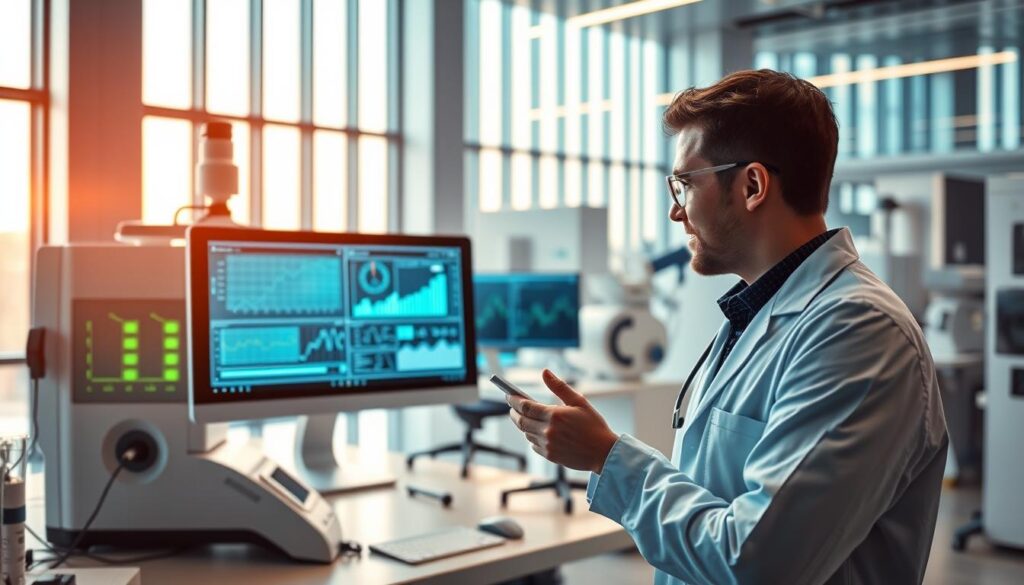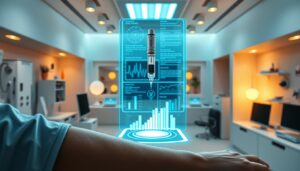Every minute, you create enough health data to fill a book. Digital health solutions are changing how we manage our health. They turn complex medical info into useful insights1. Now, you can control your health journey like never before.
Your health is now more than just numbers. About 60% of health factors come from behavior, social status, physical, and mental health1. Digital tools are linking old healthcare ways to new prevention methods2.
AI in digital health is changing medical monitoring. Wearables collect important health signs like heart rate, sleep, and activity2. These tools help track health in real-time and spot risks early.
Key Takeaways
- Digital health solutions transform personal health management
- AI enables more precise and personalized health tracking
- Wearable technologies provide continuous health monitoring
- Data-driven insights support preventative healthcare strategies
- Personal health data generation is exponentially increasing
The Evolution of Healthcare: Precision Medicine and Digital Transformation
The healthcare world is changing fast, thanks to new technologies. Precision medicine is leading this change, tailoring treatments to each patient’s needs3. Digital health tools are making care more personal and effective.
Reimagining Healthcare Approaches
Old healthcare ways are being replaced by AI and big data. Now, we use electronic health records and wearables to understand patients better3.
- Personalized treatment strategies
- Real-time health monitoring
- Data-driven diagnostic tools
The Power of Big Data Analytics
Big data is changing healthcare by making diagnoses and treatments more accurate. Machine learning models are very good, like predicting heart disease with over 80% accuracy3.
| Technology | Healthcare Impact | Accuracy Rate |
|---|---|---|
| Machine Learning | Disease Prediction | 80-85% |
| AI Diagnostics | Precision Medicine | 75-90% |
Emerging Technologies in Healthcare
Precision medicine uses big data to create personalized treatments4. Clinical trials are looking into new ways, like mixing genetic analysis with advanced imaging4.
The future of healthcare is here. It’s all about using data and personalizing care for better results.
Understanding Digital Biomarkers in Modern Healthcare
Digital biomarkers are changing healthcare by giving us new insights into health. They use advanced systems to track our health in real-time. It’s like having a personal health assistant that watches over you.
The world of digital biomarkers covers many areas:
- Chronic disease monitoring
- Physical activity tracking
- Stress and emotional well-being assessment
- Cardiovascular health evaluation
New technologies are making health monitoring better. Wearable devices track important health signs like blood sugar and heart rate5. In 2021, 39% of FDA-approved drugs were personalized, showing how important digital biomarkers are6.
Digital biomarkers represent the future of personalized healthcare, offering precise, continuous health insights.
The uses are endless. Smart biosensors have grown a lot, helping with quick health tests5. From smart contact lenses to skin sensors, these tools are changing how we see and manage our health.
Today, over 300 digital health markers are used by nearly 100 companies6. Your health journey is becoming more tailored, predictive, and proactive than ever.
Artificial Intelligence Applications in Health Monitoring
AI is changing how doctors understand and treat patients. It’s making healthcare more precise and tailored to each person7.
Healthcare is evolving with advanced machine learning. These smart systems can spot patterns in huge amounts of data that humans might miss8.
Machine Learning for Pattern Recognition
Machine learning is a big help in medical diagnosis. It’s used for:
- Accurate analysis of medical images7
- Finding complex disease patterns
- Automating routine tests
AI is really good at spotting things like diabetic retinopathy. It’s 87% sensitive and 90% specific7.
Predictive Analytics in Healthcare
Predictive analytics help doctors predict health risks. They can:
- See how diseases might progress
- Know who’s at risk
- Offer treatments just for you8
Natural Language Processing Applications
NLP is changing how we talk to patients and manage data. AI assistants can:
- Offer medical help anytime
- Look through patient records
- Give advice just for you8
These new tools are making healthcare better and more personal7.
Integrating AI and Biomarkers for Personalized Health Tracking
Personalized health tracking is changing fast with AI and biomarkers. Digital biomarkers give us new ways to see and manage our health. They offer deep insights into our bodies’ complex systems9.
AI and biomarkers together are making healthcare smarter. They help doctors find and treat problems more accurately. This means treatments can be more focused and effective10.
- AI algorithms analyze complex health data with remarkable accuracy
- Digital biomarkers provide real-time health monitoring
- Personalized health tracking becomes more comprehensive
Researchers are working on new ways to use AI and biomarkers. MIT’s work shows how these technologies can change patient care. They could help a lot with diseases like Parkinson’s10.
“The future of healthcare lies in scalable and affordable digital biomarker technologies” – Professor Deborah Estrin
Your health journey can now get smarter, thanks to AI and digital biomarkers. You’ll understand your health better9.
This new field offers many benefits. You’ll get better diagnosis, constant health checks, and treatments that fit you better10.
Wearable Technologies and Continuous Health Monitoring
Digital health is changing fast with wearable tech. These devices let you keep an eye on your health all the time11.
Today’s wearables give you deep insights into your health. They track important signs like:
- Heart rate
- Blood oxygen saturation
- Body temperature
- Physical activity levels
- Sleep patterns
Smart Devices Revolutionizing Health Tracking
Wearable sensors are now key tools for health care. They help cut down on hospital visits and costs11. They work with phones to send health data wirelessly12.
Real-time Data Collection Methods
These devices use advanced tech to collect health data. Machine learning makes this data very accurate, almost as good as a doctor’s13.
| Health Parameter | Average Measurement | Standard Deviation |
|---|---|---|
| Daily Steps | 4,419.5 steps | 3,651.9 |
| Distance Walked | 3,210.1 meters | 2,925.4 |
| Active Energy Burned | 134.6 kcal | 115.1 |
Remote Patient Monitoring Systems
Remote monitoring is changing how we care for patients. Studies show patients are very engaged. They see better health and life quality12. This tech lets doctors keep an eye on patients’ health all the time. It helps them give proactive and personalized care strategies.
Biomarker Development and Implementation in Digital Health
Digital health has changed how doctors work with biomarkers. Medical tests are getting better, thanks to new tech. This tech gives doctors a deeper look into how patients are doing14.
A study showed biomarkers are key in today’s healthcare. They help doctors make better diagnoses and treatments14.

- Advanced gene-expression data analysis
- Multi-omics data integration
- AI-powered predictive modeling
Scientists have made big steps in creating accurate models. For example, they can predict how well chemotherapy will work with 80% accuracy14. Breast cancer diagnosis models are also getting better, showing the power of digital biomarkers14.
Digital biomarkers represent the future of personalized healthcare, offering unprecedented insights into individual health trajectories.
But, there are challenges to using digital health. Ethical issues are big, with a focus on making AI in healthcare clear and fair14. New research aims to create detailed health tools that use many signs for better tests15.
As digital health grows, biomarkers lead the way in medical progress. They promise more accurate, tailored, and early healthcare.
Data Management and Privacy Concerns in Digital Health
Digital health technologies are changing healthcare, but they bring big challenges in data management and privacy. As you explore the complex world of health information systems, knowing how to keep data safe is key16.
Ensuring Data Security and Integrity
Keeping health data private needs strong strategies to protect it. AI in healthcare offers both chances and dangers in managing data16. Important things to think about include:
- Using advanced encryption methods
- Setting up strict access controls
- Being open about how data is handled
Regulatory Compliance in Health Data Management
Healthcare groups must deal with many rules to keep AI in healthcare ethical. The rise of digital health apps and tools means strict rules are needed17:
| Digital Health Metrics | Current Status |
|---|---|
| Digital Health Apps | 337,000 available |
| Prescription Digital Therapeutics | 140 approved for home use |
| Digital Diagnostics | 103 commercially available |
Ethical Considerations in AI-Driven Healthcare
Technology and patient care meet, raising big ethical questions. Transparency and patient consent are key when dealing with health data16. AI tools should:
- Reduce bias in algorithms
- Protect privacy
- Ensure fair healthcare access
“With great technological power comes great responsibility in healthcare data management.”
As digital health tech grows, finding a balance between new ideas and ethics is vital16. Your effort to grasp these complex issues will help shape the future of healthcare technology responsibly.
The Future of Personalized Health Technology
The world of health tech is changing fast, leading to big steps in personalized medicine. New tech is changing how we get health care, making treatments more exact and tailored to each person18. Digital health tools are getting smarter, using lots of data to give us detailed health info19.

- Advanced multimodal AI integration19
- Real-time health monitoring capabilities18
- Deep phenotyping for precise disease categorization18
- Enhanced data analytics for predictive healthcare18
The future of digital health will use the latest tech to link patients, doctors, and systems18. Experts in life sciences, computing, and medicine will play a big role in these advances18.
| Technology | Potential Impact |
|---|---|
| Augmented Reality | Treatment and diagnostic visualization |
| Machine Learning | Predictive health analytics |
| Multimodal AI | Comprehensive data integration |
These technologies have a lot of promise, but we must think about ethics. It’s important to make sure digital advice doesn’t leave some people out18.
Challenges and Opportunities in Adopting Digital Health Solutions
Digital health adoption is a complex mix of new chances and big hurdles. The global digital health market grew fast, hitting around US$211 billion in 202220. Healthcare groups face many barriers when they try to use digital health tools. They need smart plans to beat tech and cultural hurdles.
Key challenges in digital health adoption include:
- Interoperability between different healthcare systems
- Data privacy and security concerns
- Resistance to technological change
- Limited digital literacy among healthcare providers
Healthcare innovation faces more than just tech issues. With over 337,000 digital health apps out there21, picking the right ones is crucial. A good digital change plan must tackle tech and people aspects.
There are bright spots for healthcare groups ready to dive into digital health. The market is set to grow at 18.6% yearly from 2023 to 203020. They can use AI-powered diagnostics, wearable tech, and advanced analytics to better care and work better.
To do well in digital health adoption, healthcare leaders should:
- Invest in thorough staff training
- Develop strong data governance frameworks
- Focus on tech that puts patients first
- Build strong partnerships with tech providers
By tackling healthcare innovation challenges wisely, groups can turn problems into chances for better patient care and work flow.
Conclusion: Embracing the Digital Health Revolution
The digital health impact is changing healthcare in big ways. You now know more about tracking your health thanks to AI and biomarkers22. This change lets doctors care for patients in new, better ways23.
Today, technology helps us manage our health better than ever before. It lets us watch our health in real time, cutting down on hospital stays and making treatments better22. Wearables and AI give us health tips that fit our own needs23.
Looking ahead, digital health tech will tackle big healthcare problems. Even with challenges like keeping data safe and setting up systems, the benefits are huge24. Joining this digital health movement means better, more focused care for you22.
To make the most of these new tools, we need to keep learning and working together. By keeping up with new tech, you can help lead a healthcare shift that puts your health first2322.
FAQ
What are digital biomarkers and how do they differ from traditional biomarkers?
How can AI improve health monitoring and disease detection?
Are wearable health technologies accurate and reliable?
What privacy concerns exist with digital health solutions?
How can digital health technologies help manage chronic conditions?
What future developments can we expect in personalized health technology?
Can digital health solutions improve healthcare accessibility?
What challenges exist in adopting digital health technologies?
Source Links
- Precision Medicine, AI, and the Future of Personalized Health Care – https://pmc.ncbi.nlm.nih.gov/articles/PMC7877825/
- Digital Resilience Biomarkers for Personalized Health Maintenance and Disease Prevention – https://pmc.ncbi.nlm.nih.gov/articles/PMC8521930/
- Joint Expedition: Exploring the Intersection of Digital Health and AI in Precision Medicine with Team Integration – https://pmc.ncbi.nlm.nih.gov/articles/PMC11051462/
- Enabling technologies for personalized and precision medicine – https://pmc.ncbi.nlm.nih.gov/articles/PMC7924935/
- Digital biomarkers: 3PM approach revolutionizing chronic disease management — EPMA 2024 position – https://pmc.ncbi.nlm.nih.gov/articles/PMC11147994/
- Digital Biomarkers – The Future of Precision Medicine :: Parexel – https://www.parexel.com/insights/blog/digital-biomarkers-the-future-of-precision-medicine
- Artificial intelligence in healthcare: transforming the practice of medicine – https://pmc.ncbi.nlm.nih.gov/articles/PMC8285156/
- Innovation and challenges of artificial intelligence technology in personalized healthcare – Scientific Reports – https://www.nature.com/articles/s41598-024-70073-7
- Walk, talk, think, see and feel: harnessing the power of digital biomarkers in healthcare – npj Digital Medicine – https://www.nature.com/articles/s41746-024-01023-w
- MIT Unveils Digital Biomarkers Transforming Precision Health Care | ICT&health International – https://ictandhealth.com/news/mit-unveils-digital-biomarkers-transforming-precision-health-care
- The Emergence of AI-Based Wearable Sensors for Digital Health Technology: A Review – https://pmc.ncbi.nlm.nih.gov/articles/PMC10708748/
- The Future of Wearable Technologies and Remote Monitoring in Health Care – https://pmc.ncbi.nlm.nih.gov/articles/PMC8325475/
- Population Digital Health: Continuous Health Monitoring and Profiling at Scale – https://ojphi.jmir.org/2024/1/e60261
- The Promise of Explainable AI in Digital Health for Precision Medicine: A Systematic Review – https://pmc.ncbi.nlm.nih.gov/articles/PMC10971237/
- The promise of digital healthcare technologies – https://pmc.ncbi.nlm.nih.gov/articles/PMC10562722/
- The intersection of digital health and artificial intelligence: Clearing the cloud of uncertainty – https://pmc.ncbi.nlm.nih.gov/articles/PMC11758513/
- Digital Health Trends 2024 – https://www.iqvia.com/insights/the-iqvia-institute/reports-and-publications/reports/digital-health-trends-2024
- Frontiers | Personalized Health Care and Public Health in the Digital Age – https://www.frontiersin.org/journals/digital-health/articles/10.3389/fdgth.2021.595704/full
- Multimodal AI meets personalized healthcare – https://www.capgemini.com/us-en/insights/expert-perspectives/multimodal-ai-meets-personalized-healthcare/
- Digital health: trends, opportunities and challenges in medical devices, pharma and bio-technology – https://pmc.ncbi.nlm.nih.gov/articles/PMC10089382/
- Digital Health Tools are Expanding in Scope and Function to Aid Patient Diagnosis, Treatment and Monitoring, Says IQVIA Institute – https://www.iqvia.com/newsroom/2024/12/digital-health-tools-are-expanding-in-scope-and-function-to-aid-patient-diagnosis
- The Evolution of Digital Therapeutics in Medicine – https://www.pharmafocusamerica.com/articles/the-evolution-of-digital-therapeutics-in-medicine
- Digital Biomarkers and AI for Chronic Disease Management: Innovations in Healthcare – Dr Arun Hari – https://drarunhari.com/digital-biomarkers-and-ai-for-chronic-disease-management-innovations-in-healthcare/
- Frontiers | The promise of digital healthcare technologies – https://www.frontiersin.org/journals/public-health/articles/10.3389/fpubh.2023.1196596/full



